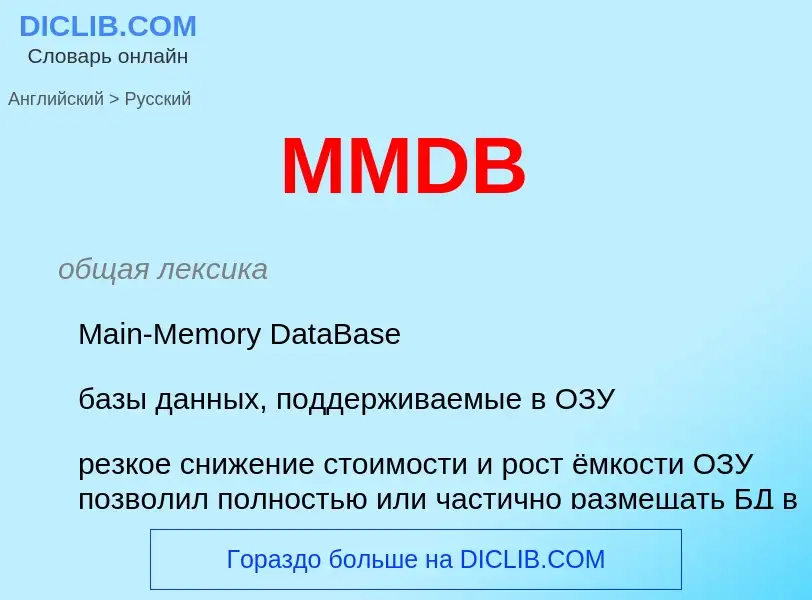Übersetzung und Analyse von Wörtern durch künstliche Intelligenz ChatGPT
Auf dieser Seite erhalten Sie eine detaillierte Analyse eines Wortes oder einer Phrase mithilfe der besten heute verfügbaren Technologie der künstlichen Intelligenz:
- wie das Wort verwendet wird
- Häufigkeit der Nutzung
- es wird häufiger in mündlicher oder schriftlicher Rede verwendet
- Wortübersetzungsoptionen
- Anwendungsbeispiele (mehrere Phrasen mit Übersetzung)
- Etymologie
MMDB - Übersetzung nach Englisch
общая лексика
Main-Memory DataBase
базы данных, поддерживаемые в ОЗУ
резкое снижение стоимости и рост ёмкости ОЗУ позволил полностью или частично размещать БД в оперативной памяти. Такое решение обеспечивает по сравнению с БД, размещаемыми на дисках, более высокую производительность. Для отката транзакций и восстановления данных в случае отказа системы в MMDB ведется журналирование в энергонезависимой памяти, либо сохранение БД в контрольных точках на диске, возможно, с помощью специального процессора
Смотрите также
Wikipedia
An in-memory database (IMDB, or main memory database system (MMDB) or memory resident database) is a database management system that primarily relies on main memory for computer data storage. It is contrasted with database management systems that employ a disk storage mechanism. In-memory databases are faster than disk-optimized databases because disk access is slower than memory access and the internal optimization algorithms are simpler and execute fewer CPU instructions. Accessing data in memory eliminates seek time when querying the data, which provides faster and more predictable performance than disk.
Applications where response time is critical, such as those running telecommunications network equipment and mobile advertising networks, often use main-memory databases. IMDBs have gained much traction, especially in the data analytics space, starting in the mid-2000s – mainly due to multi-core processors that can address large memory and due to less expensive RAM.
A potential technical hurdle with in-memory data storage is the volatility of RAM. Specifically in the event of a power loss, intentional or otherwise, data stored in volatile RAM is lost. With the introduction of non-volatile random-access memory technology, in-memory databases will be able to run at full speed and maintain data in the event of power failure.

